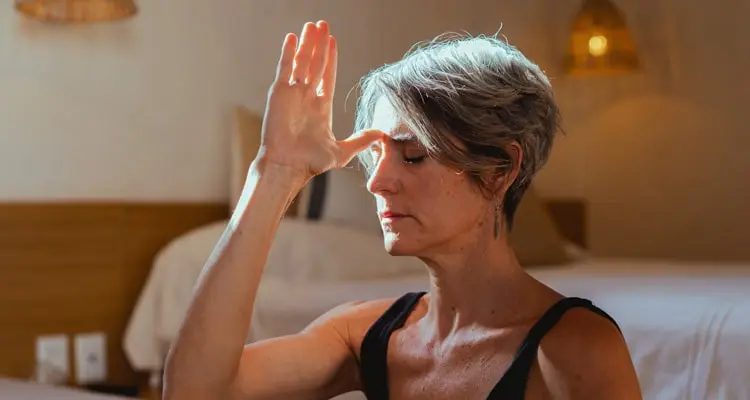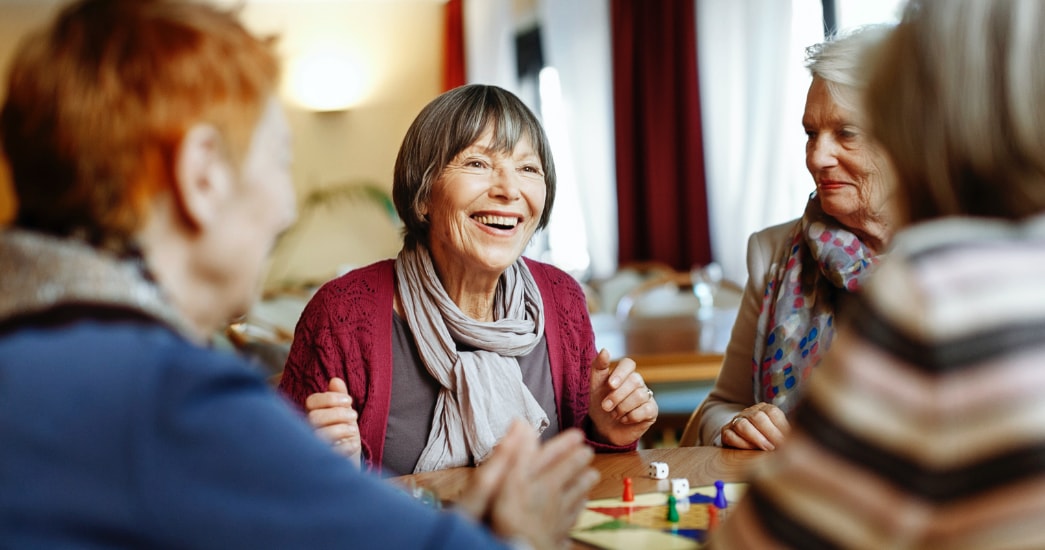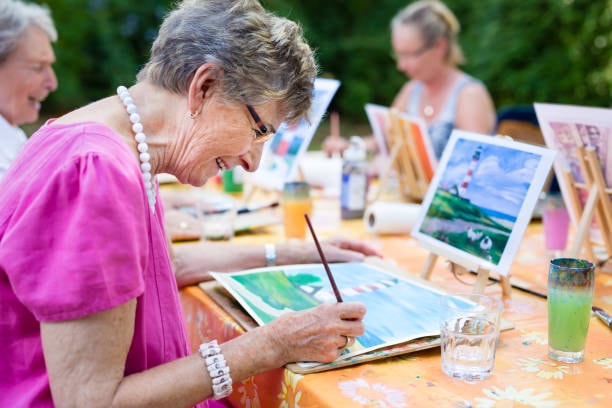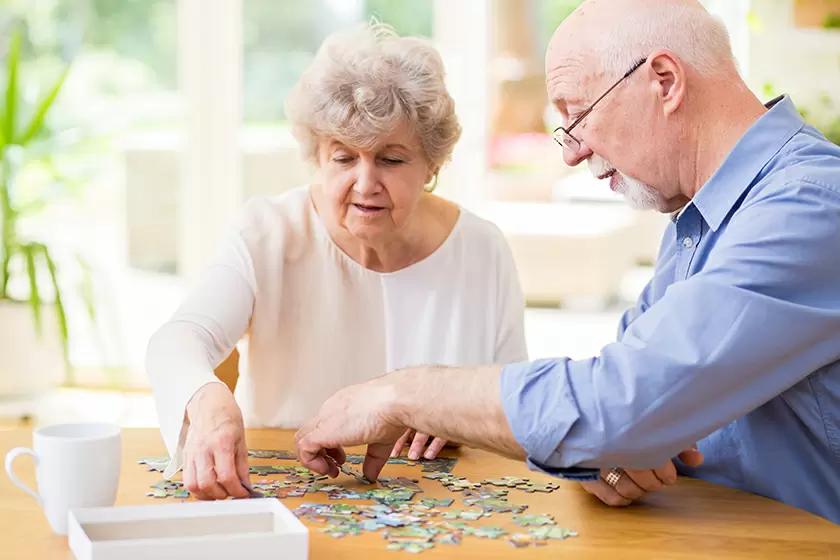As we age, mental exercises become as important as staying physically fit to maintain a healthy mind. These exercises are crucial in keeping our brains sharp, helping us retain cognitive function and enhance memory. For my dad, although he had a stroke that affected his body, it mostly spared his mind. To help keep his sharp intellect intact, we encouraged him to engage in mental exercises each day. These activities were simple but often more fun than challenging, proving that brain health can be enjoyable and effective.
Incorporating mental exercises into daily routines can significantly benefit cognitive health. Whether it’s solving puzzles, playing memory games, or learning new skills, there are numerous ways to keep the brain active and engaged. This article will explore the best mental exercises for seniors, offering practical and enjoyable activities that can help maintain mental agility throughout the aging process.
Contents
Understanding Cognitive Aging: Tips for Staying Mentally Sharp and Healthy

Cognitive aging might sound intimidating, but it’s just a fancy way of talking about how our thinking, memory, and reasoning change as we get older.
Some changes are completely normal, like taking a bit longer to learn new things, while others might not be as expected, such as forgetting familiar words or the names of friends you’ve known for years.
Identifying the signs of cognitive decline early on can be incredibly helpful. We’re talking about things like misplacing items frequently, having trouble following conversations, or finding it hard to plan or organize.
Noticing these signs early means you can take steps to address them, keeping your brain in top shape. Keeping your mind sharp isn’t just about crossing items off a list or solving a crossword puzzle. It’s about overall mental health.
Staying mentally healthy is super important for enjoying life, staying independent, and feeling your best. So, whether you’re 60 or 90, focusing on mental well-being should be at the top of your to-do list.
With cognitive aging, getting the right info and taking proactive steps can make a world of difference. It’s not just about getting older; it’s about living better.
Key Takeaways
- Engaging in activities like puzzles, memory games, or learning new skills helps preserve mental sharpness and enhances memory and problem-solving abilities as we age.
- Recognizing signs of cognitive decline, such as memory lapses or trouble organizing, allows for proactive steps to maintain mental health.
- Artistic pursuits like painting or music not only stimulate the brain but also reduce stress, improve mood, and foster social connections.
- Regular practice of mindfulness or meditation helps reduce stress, boost emotional health, and maintain cognitive function by enhancing attention span and memory retention.
- Making mental exercises a regular part of daily life, whether through solo activities or social engagements, ensures long-term cognitive benefits and promotes a positive outlook on aging.
Significance of Mental Exercises

Mental exercises play a big role in keeping our brains fit, much like physical workouts do for the body. Regularly engaging the brain with activities like puzzles, reading, or learning a new skill can help enhance memory, boost creativity, and improve problem-solving skills.
Brain Workouts for Mental Health
Just like your muscles need a good flex, your brain thrives on new challenges. There’s some solid science backing this up. Research shows that people who keep their minds active tend to maintain better cognitive function as they age.
Mental exercises can help create new neural pathways, which basically means keeping those mental gears turning smoothly even as the years roll by. How does this compare to physical exercises?
Both are crucial and while hitting the gym takes care of your physical health, giving your brain a workout helps ensure mental well-being. Combining both is the ultimate power duo for holistic health. Getting started with mental exercises doesn’t have to be daunting.
Engage Your Mind for Better Focus
Even small daily mental workouts can have a big impact over time. Think of it like this: more Sudoku puzzles, less sitting around. In no time, you’ll find your mind feeling sharper, quicker, and more focused.
Investing time each day to engage your mind isn’t just about staying busy; it’s about maintaining quality of life. So, grab that crossword puzzle, challenge yourself with a new book, or even learn a bit of chess. Your future self will thank you.
Check This Out:
Memory Boosters: Exercising Recall and Retention

Taking steps to boost your memory can make a huge difference in your everyday life, especially as the years pass by. Mental exercises, such as memory exercises, are like a gym session for your brain, keeping those recall skills in tip-top shape.
Practices like repeating names when you meet someone or trying to remember a list of items can work wonders for your memory. Games that challenge your brain, such as brainteasers or digital memory apps, are excellent ways to keep those neurons firing.
Benefits of Memory Exercises
Stories from older adults who’ve taken up memory exercises often confirm their benefits. Many find that these activities improve their memory and bring a sense of accomplishment. It’s all about seeing what you’ve forgotten come back to you easier and faster.
Imagine being that person who always remembers birthdays, has no trouble managing those daily to-do lists, and never forgets where the car is parked. This could be you as you make memory exercises a regular part of your routine.
Strengthening your memory doesn’t require loads of time; just a few fun, consistent practices can make a real difference. With a stronger memory, the world becomes less about what you’ve forgotten and more about what you can remember.
Critical Thinking: Nurturing Analytical Skills
Sharpening critical thinking skills is about staying curious and questioning the world around you. Mental exercises serve as a toolkit for facing new challenges, tackling puzzles, and understanding complex information.
Engaging in activities that call for problem-solving or strategic planning can significantly boost these skills. Try tackling a Sudoku or indulge in board games that require strategic play, like chess or Scrabble. It’s about making those connections, seeing patterns, and thinking a few steps ahead.
Boosting Analytical Skills
For older adults, maintaining these skills is crucial. Analytical thinking exercises not only keep your mind active but also help you make informed decisions, which is essential for staying independent.
Strategic games are particularly beneficial as they offer rewarding ways to practice analytical skills. They engage different parts of the brain, encourage adaptability, and, most importantly, add fun to thinking critically.
Making time for activities that require logical reasoning, whether through daily routines or weekly get-togethers with friends, becomes a delightful blend of social interaction and mental sharpening. It’s all about keeping the mind flexible and ready for anything.
Check out this video on how to keep your mind sharp and maintain a healthy brain as you age.
By: The Fit Mother Project – Fitness For Busy Moms
Drawing Creativity: Artistic Mental Stimulation

Getting creative is a fantastic way to keep the mind sharp and inspired through mental exercises. Whether you’re sketching, painting, or crafting, artistic activities offer a unique mental workout. They engage different parts of your brain, sparking imagination and boosting problem-solving skills.
Engaging in creative outlets like art and music provides more than just mental stimulation. These activities offer therapeutic benefits, too, helping reduce stress, improve mood, and even lower anxiety. They’re great for emotional well-being and contribute to overall mental health.
Art for Connection
For many seniors, getting involved in art projects opens up new avenues for expression and connection. Participating in community art classes or attending workshops can be highly rewarding. These settings not only provide creative exploration but also foster social interaction.
Several senior centers run dedicated art programs tailored specifically for older adults, recognizing the dual benefits of creativity and community. Such programs give a sense of purpose and accomplishment, encouraging lifelong learning and keeping the mind active.
Embracing creativity as part of your routine doesn’t mean you have to be Picasso. It’s about finding joy in the process and the happiness it brings. You might find yourself picking up a paintbrush at sunset, strumming a few chords on a guitar, or simply doodling in a notebook. It’s all about keeping your creativity flowing and your mind engaged.
Mindfulness and Meditation: Cultivating Mental Clarity
Practicing mindfulness and meditation offers a soothing pathway to enhancing mental clarity through various mental exercises. These techniques aren’t just for monks on mountain tops—they’re accessible tools for anyone looking to improve their mental focus and reduce stress.
Regular meditation can bring about a host of psychological benefits. It’s known for increasing attention span, improving emotional health, and even lessening memory loss related to aging. More than just calming your mind. It’s about training it to focus and redirect thoughts.
Mindfulness Practices
Adopting mindfulness practices can mean setting aside a few minutes each day to simply breathe or reflect quietly. It could be about noticing the sensations of your body, listening to sounds around you, or even loving-kindness meditation, where you mentally send goodwill and kindness toward others.
For seniors, integrating these practices into daily routines can be particularly powerful. They offer a chance to slow down, prioritize mental health, and cultivate inner peace and contentment. Developing a habit of mindfulness and meditation doesn’t have to be lengthy or complicated.
Starting small, perhaps just five minutes a day can make a significant difference. With time, you’ll likely find yourself more focused, more at ease, and better equipped to handle whatever life throws your way.
Social Engagement: Mental Health through Interaction

Interacting with others isn’t just about having a good time—it’s also a powerful way to keep your mind active and engaged through mental exercises. Whether it’s a quick coffee with a friend or a lively debate in a book club, social activities stimulate the brain and keep those cognitive skills sharp.
There’s a strong connection between social engagement and cognitive health. Engaging with others can help improve memory, reduce the risk of depression, and even increase longevity. It’s like giving your brain a little workout every time you chat.
Social Engagement
Community groups or clubs play a significant role in maintaining mental and emotional well-being. They offer opportunities to learn new things, meet different people, and challenge your mind in new ways. Plus, they’re often loads of fun.
Real-life stories abound about the benefits of social engagement. Seniors who participate in social clubs often report feeling more energized, happier, and even sharper in their thinking. These interactions provide more than just companionship and bring a sense of purpose.
Finding ways to be socially active could be as simple as joining a local group or volunteering for causes you care about. It’s all about staying connected, building relationships, and keeping your social calendar lively. That social buzz keeps your mind ticking beautifully.
Implementing a Routine: Making Mental Exercises Habitual

Consistency is key when it comes to keeping your mind active. Building a routine with mental exercises helps ensure these activities become a regular, enjoyable part of your life. By regularly engaging in mental exercises, you can make brain health a priority and develop habits that boost cognitive function over time.
The goal is to create a balanced mental exercise plan that’s tailored to your interests and lifestyle. It doesn’t need to be complicated. Start by setting aside specific weekly times dedicated to activities like puzzle-solving, reading, or even joining a local class for something new.
Combined Activities
Combining physical and mental activities can amplify the benefits. A morning walk paired with a podcast or audiobook stimulates both body and mind. Think of it as giving yourself a double bonus of health benefits.
Family and friends can play an essential role in this routine, too. Involving them in activities, such as game nights or collaborative projects, not only makes the exercises more fun but also strengthens bonds.
Tracking progress and celebrating milestones can keep motivation levels high. Whether remembering more names or getting that chess strategy just right, acknowledging these wins gives a sense of accomplishment and encouragement to keep going.
Watch this video on how to keep your brain sharp as you age.
By: Dana Foundation
Maintaining Mental Sharpness: Exercises for Healthy Aging
Incorporating mental exercises into your daily routine is an effective way to enhance cognitive function and preserve mental sharpness as you age. As highlighted, simple activities such as solving puzzles, playing memory games, and engaging in new learning experiences can significantly impact. These exercises help improve memory and problem-solving skills and provide a sense of accomplishment, boosting overall mental well-being. Just like physical exercises benefit your body, mental exercises are crucial for maintaining a healthy brain and fostering a positive outlook.
By making mental exercises a regular part of your routine, you empower yourself to stay mentally fit and independent as you age. Engaging in various activities that challenge the mind, like memory boosters or strategic games, can keep your cognitive abilities sharp. Whether done individually or in a social setting, these exercises offer fun and lasting benefits. The key to success is consistency, and with a balanced routine, you can enhance both your cognitive health and overall quality of life.
Frequently Asked Questions
How Can Mental Exercises Help Seniors Maintain Their Cognitive Health?
Mental exercises, such as solving puzzles, playing memory games, and learning new skills, help seniors improve memory, boost problem-solving abilities, and enhance overall cognitive function, promoting mental sharpness as they age.
What Are Some Simple Mental Exercises for Seniors to Start With?
Seniors can begin with activities like crossword puzzles, Sudoku, memory exercises, or strategic games like chess and Scrabble. These activities provide both mental stimulation and enjoyment.
Is It Necessary to Combine Mental and Physical Exercises for Brain Health?
Yes, combining physical exercises with mental activities provides a holistic approach to well-being. For example, a walk while listening to a podcast or audiobook stimulates both the body and the brain, enhancing cognitive function.
What Role Does Social Engagement Play in Keeping the Mind Sharp?
Social interaction is vital for maintaining cognitive health. Engaging in conversations, joining clubs, or participating in community activities can stimulate the brain, improve memory, and reduce the risk of depression, all while fostering a sense of purpose.
How Can Seniors Track Their Progress in Mental Exercises?
Tracking progress can be as simple as noting improvements in memory recall or problem-solving skills. Celebrating milestones, like remembering more names or completing more puzzles, boosts motivation and encourages consistency.
Stay in Touch with Us!
Are you ready to dive into a world of care and valuable insights? Connect with us on social media for positive content, professional tips, and essential advice on supporting seniors!
? Website: Visit sr-parents.com for comprehensive articles and resources on senior health, wellness, and care.
? Pinterest: Find helpful caregiving advice, home solutions, and senior-friendly activities at pinterest.com/seniorparents.
? Facebook: Join our caring community at facebook.com/sr.parents. Connect with fellow caregivers, share experiences, and gain inspiration.
? Twitter: Follow us at twitter.com/senior_parents for the latest news, updates, and discussions on senior care.
? Instagram: Discover heartwarming moments, caregiving tips, and a glimpse into senior life at instagram.com/seniorparents.
Stay connected, motivated, and informed with our newest stories and expert articles on senior care.





